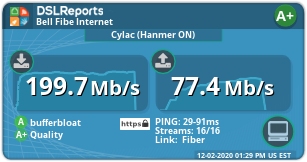I'm trying to get this script working on my OpenWRT 19.07.1 on a TP-Link Archer C7 v2.
I've installed the required packages, however whenever I run a test I get this:
0 Mbps up/down
speedtest-netperf.sh -H netperf-east.bufferbloat.net -p 1.1.1.1 --concurrent
2020-02-12 11:08:13 Starting speedtest for 60 seconds per transfer session.
Measure speed to netperf-east.bufferbloat.net (IPv4) while pinging 1.1.1.1.
Download and upload sessions are concurrent, each with 5 simultaneous streams.
...................................................................................................................................
WARNING: netperf returned errors. Results may be inaccurate!
Download: 0.00 Mbps
Upload: 0.00 Mbps
Latency: [in msec, 132 pings, 0.00% packet loss]
Min: 17.630
10pct: 17.839
Median: 18.447
Avg: 18.508
90pct: 19.138
Max: 20.272
CPU Load: [in % busy (avg +/- std dev), 129 samples]
cpu0: 14.6 +/- 20.1
Overhead: [in % used of total CPU available]
netperf: 1.4
To troubleshoot I used the suggestions posted within this dicussion:
ping netperf-east.bufferbloat.net
PING netperf-east.bufferbloat.net (23.226.232.80): 56 data bytes
64 bytes from 23.226.232.80: seq=0 ttl=55 time=45.363 ms
64 bytes from 23.226.232.80: seq=1 ttl=55 time=45.899 ms
64 bytes from 23.226.232.80: seq=2 ttl=55 time=46.087 ms
64 bytes from 23.226.232.80: seq=3 ttl=55 time=44.909 ms
and ping
ping gstatic.com
PING gstatic.com (172.217.7.163): 56 data bytes
64 bytes from 172.217.7.163: seq=0 ttl=50 time=28.128 ms
64 bytes from 172.217.7.163: seq=1 ttl=50 time=27.882 ms
64 bytes from 172.217.7.163: seq=2 ttl=50 time=27.548 ms
and checked what's installed:
opkg list-installed |grep netperf
netperf - 2.7.0-1
speedtest-netperf - 1.0.0-1
root@GateKeeper:~# which netperf
/usr/bin/netperf
and nslookups:
nslookup netperf.bufferbloat.net
Server: 127.0.0.1
Address: 127.0.0.1#53
Name: netperf.bufferbloat.net
netperf.bufferbloat.net canonical name = netperf.richb-hanover.com
Name: netperf.richb-hanover.com
netperf.richb-hanover.com canonical name = atl.richb-hanover.com
Name: atl.richb-hanover.com
Address 1: 23.226.232.80
netperf.bufferbloat.net canonical name = netperf.richb-hanover.com
netperf.richb-hanover.com canonical name = atl.richb-hanover.com
and
nslookup gstatic.com
Server: 127.0.0.1
Address: 127.0.0.1#53
Name: gstatic.com
Address 1: 172.217.7.163
Address 2: 2607:f8b0:4004:800::2003
and ran netperf directly and got:
netperf -4 -H netperf.bufferbloat.net -t TCP_STREAM -l 10 -d
resolve_host called with host 'netperf.bufferbloat.net' port '(null)' family AF_INET
getaddrinfo returned the following for host 'netperf.bufferbloat.net' port '(null)' family AF_INET
cannonical name: 'atl.richb-hanover.com'
flags: 0 family: AF_INET: socktype: SOCK_STREAM protocol IPPROTO_TCP addrlen 16
sa_family: AF_INET sadata: 0 0 23 226 232 80 0 0 0 0 0 0 0 0 0 0
scan_omni_args called with the following argument vector
netperf -4 -H netperf.bufferbloat.net -t TCP_STREAM -l 10 -d
sizeof(omni_request_struct)=200/648
sizeof(omni_response_struct)=204/648
sizeof(omni_results_struct)=284/648
Program name: netperf
Local send alignment: 8
Local recv alignment: 8
Remote send alignment: 8
Remote recv alignment: 8
Local socket priority: -1
Remote socket priority: -1
Local socket TOS: cs0
Remote socket TOS: cs0
Report local CPU 0
Report remote CPU 0
Verbosity: 1
Debug: 1
Port: 12865
Test name: TCP_STREAM
Test bytes: 0 Test time: 10 Test trans: 0
Host name: netperf.bufferbloat.net
installing catcher for all signals
Could not install signal catcher for sig 32, errno 22
Could not install signal catcher for sig 33, errno 22
Could not install signal catcher for sig 34, errno 22
Could not install signal catcher for sig 128, errno 22
remotehost is netperf.bufferbloat.net and port 12865
resolve_host called with host 'netperf.bufferbloat.net' port '12865' family AF_INET
getaddrinfo returned the following for host 'netperf.bufferbloat.net' port '12865' family AF_INET
cannonical name: 'atl.richb-hanover.com'
flags: 0 family: AF_INET: socktype: SOCK_STREAM protocol IPPROTO_TCP addrlen 16
sa_family: AF_INET sadata: 50 65 23 226 232 80 0 0 0 0 0 0 0 0 0 0
resolve_host called with host '0.0.0.0' port '0' family AF_INET
getaddrinfo returned the following for host '0.0.0.0' port '0' family AF_INET
cannonical name: '0.0.0.0'
flags: 0 family: AF_INET: socktype: SOCK_STREAM protocol IPPROTO_TCP addrlen 16
sa_family: AF_INET sadata: 0 0 0 0 0 0 0 0 0 0 0 0 0 0 0 0
establish_control called with host 'netperf.bufferbloat.net' port '12865' remfam AF_INET
local '0.0.0.0' port '0' locfam AF_INET
bound control socket to 0.0.0.0 and 0
establish_control: connect failed, errno 146 Connection refused
trying next address combination
establish control: are you sure there is a netserver listening on netperf.bufferbloat.net at port 12865?
establish_control could not establish the control connection from 0.0.0.0 port 0 address family AF_INET to netperf.bufferbloat.net port 12865 address family AF_INET
seems my error is:
establish_control called with host 'netperf.bufferbloat.net' port '12865' remfam AF_INET
local '0.0.0.0' port '0' locfam AF_INET
bound control socket to 0.0.0.0 and 0
establish_control: connect failed, errno 146 Connection refused
trying next address combination
establish control: are you sure there is a netserver listening on netperf.bufferbloat.net at port 12865?
establish_control could not establish the control connection from 0.0.0.0 port 0 address family AF_INET to netperf.bufferbloat.net port 12865 address family AF_INET
I am using unbound on port 53 for my DNS (forward to TLS provider) and dnsmask on port 1053 for local DNS.
Any suggestions?
Thanks!



